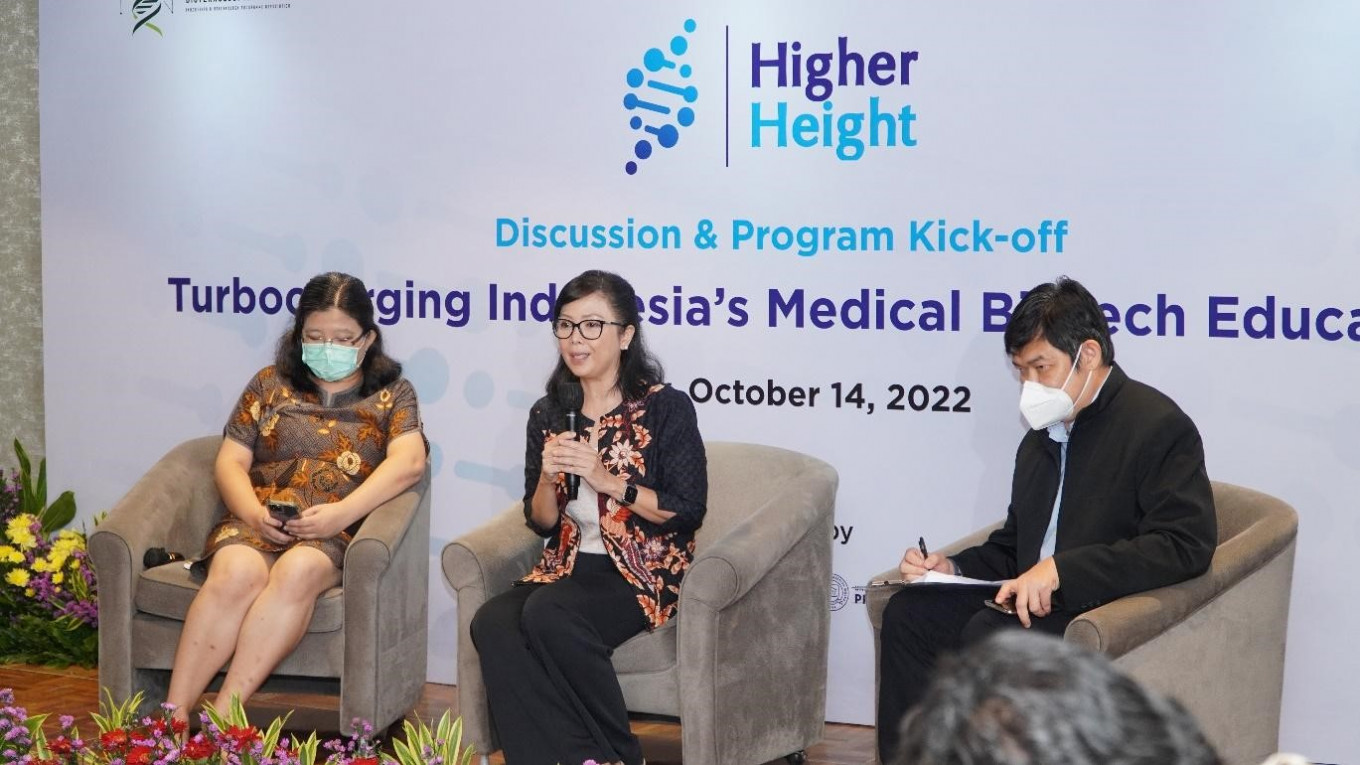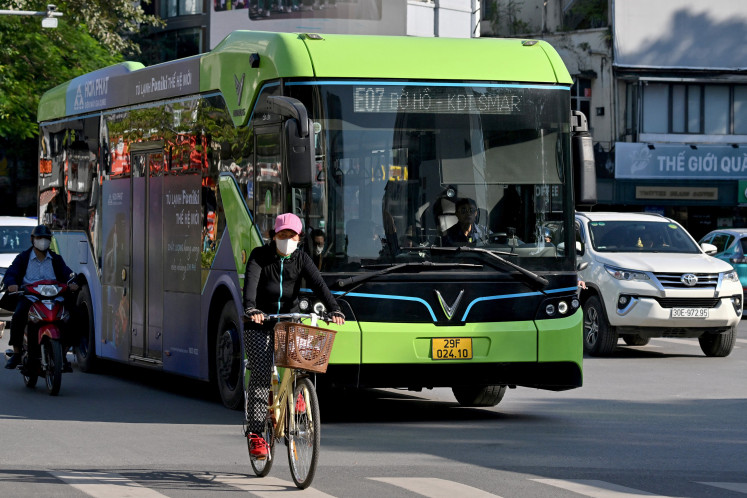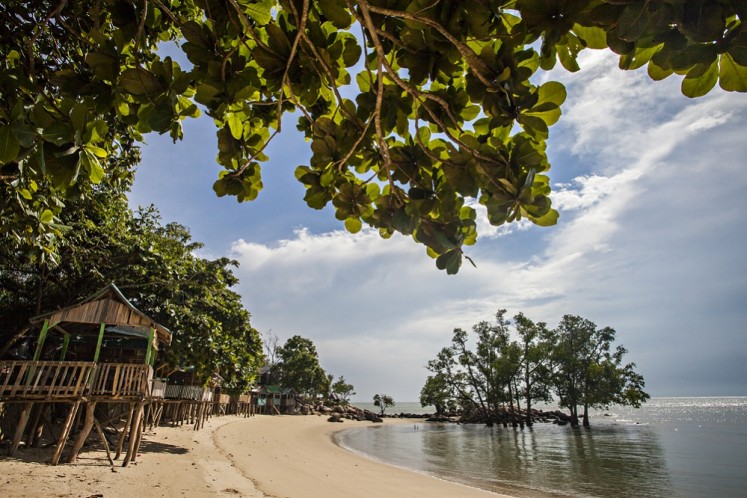Popular Reads
Top Results
Can't find what you're looking for?
View all search resultsPopular Reads
Top Results
Can't find what you're looking for?
View all search resultsIndonesia left behind in biotech, HigherHeight aims at human resources
Biotechnology is looking to surpass the shares of chemically derived drugs and dominate the global pharmaceutical industry by 52 percent in 2027, according to data from the International Pharmaceutical Manufacturers Group (IPMG).
Change text size
Gift Premium Articles
to Anyone
 International Pharmaceutical Manufacturers Group (IPMG) executive director Inge Sanitasia Kusuma takes center stage at the grand launching of Pfizer Indonesia’s HigherHeight program with Association of Indonesia's Biotechnology Program Studies (IPSBI) head Listya U. Karmawan (left) and moderator Yalun Arifin (right) on Friday, Oct. 14. The grand launch was held to discuss the acceleration of medical biotechnology education in Indonesia.
International Pharmaceutical Manufacturers Group (IPMG) executive director Inge Sanitasia Kusuma takes center stage at the grand launching of Pfizer Indonesia’s HigherHeight program with Association of Indonesia's Biotechnology Program Studies (IPSBI) head Listya U. Karmawan (left) and moderator Yalun Arifin (right) on Friday, Oct. 14. The grand launch was held to discuss the acceleration of medical biotechnology education in Indonesia.
B
iotechnology is looking to surpass the shares of chemically derived drugs and dominate the global pharmaceutical industry by 52 percent in 2027, according to data from the International Pharmaceutical Manufacturers Group (IPMG). This means that advancing biotechnology is a necessity. However, for Indonesia’s biotechnology sector, challenges persist.
IPMG executive director Inge Sanitasia Kusuma also revealed that Indonesia has an alarmingly low number of biotechnology researchers, with only 90 researchers per million population. This is a stark contrast compared to neighboring countries Singapore and Malaysia, which bring in 6,729 and 2,274 biotechnology researchers, respectively. Not only that, according to the Health Ministry, Indonesia greatly falls behind in research and development (R&D), with only 0.2 percent of the country’s total GDP allotted for R&D.
As a result, Indonesia ranks the lowest in Asia in terms of human resources and R&D in biotechnology.
Given the state of the country’s biotechnology sector, pharmaceutical company Pfizer Indonesia, together with the Association of Indonesia’s Biotechnology Program Studies (IPSBI), recently launched its biotechnology program HigherHeight for a second year.
Targeting lecturers and researchers from medical biotechnology, HigherHeight is aimed at strengthening the capacity and quality of human resources in the field. It is supported by Tenggara Strategics, the Center for Strategic and International Studies (CSIS), Prasetiya Mulya University and The Jakarta Post.
The program’s grand launching, held on Oct. 14, featured a national seminar with the theme “Turbocharging Indonesia’s Medical Biotech Education.” In attendance was Pfizer Indonesia president director Nora T. Siagian, who, along with Health Minister Budi Gunadi Sadikin, provided valuable remarks on the centrality of human resources for medical biotechnology advancement.
“Breakthroughs in the field of medical biotechnology have greatly benefited us. However, technological advances alone are not enough to advance medical biotechnology for health resilience. An important asset we must maintain and improve is the quality of human resources in the field - individuals who are able to take advantage of such technologies,” said Budi.
Inge recommends the government design, implement and measure the performance of the national biotechnology strategy blueprint in addition to developing a research ecosystem with international standards.
“Indonesia’s biotechnology blueprint, when available, must be implemented immediately,” Inge said during the launching of this year’s HigherHeight program.
The program recognizes that top-quality education plays a role in achieving quality research and human resources in biotechnology. Therefore, a discussion on medical biotechnology education took place between a panel of high-ranking intellectuals and professionals in the field.
Universities could help advance biotechnology through a penta-helix collaboration, according to IPSBI head Listya U. Karmawan. The collaboration would entail the government, industry, community and mass media. However, Listya posits that medical biotechnology education faces challenges in the design of its curriculum and the availability of costly biotechnology equipment.
Meanwhile, Health Ministry director for the pharmaceutical and medical device resilience directorate, Roy Himawan, took the opportunity to explain the government’s efforts to advance biotechnology through its Biomedical and Genome Science Initiative (BGSI), established with the goal to boost Indonesia into an era of biotechnology and precision medicine.
Also joining the discussion was Stephen Ezell, vice president of Global Innovation Policy at the Information Technology and Innovation Foundation (ITIF), a leading US-based science and technology policy think tank.
Grounding his discussion on his review of Mexico’s life-sciences ecosystem, Stephen proposed key innovation priorities that could support the acceleration of Indonesia’s research and human resources in biotechnology. This involves increasing investment in education and R&D, bolstering and supporting entrepreneurship and providing biotechnology students with intellectual property (IP) rights over their inventions during university.
With almost 300 participants in attendance, the HigherHeight grand launch was met with high enthusiasm. The program is set to run from Oct. 17 to 28.
This article is published in association with Tenggara Strategics, a program partner of HigherHeight.










